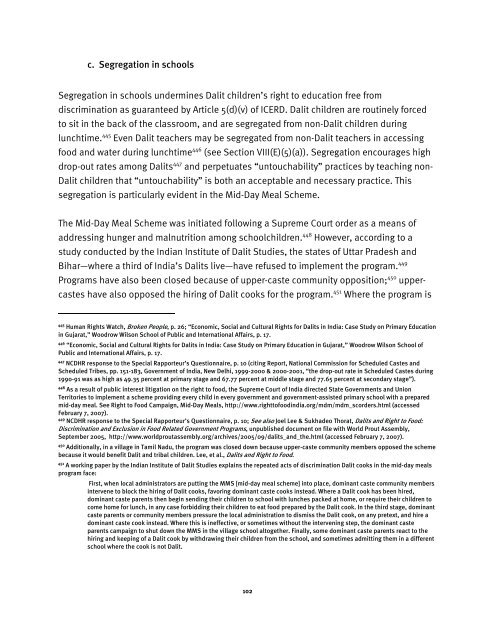Caste Discrimination against India's âUntouchablesâ - Human Rights ...
Caste Discrimination against India's âUntouchablesâ - Human Rights ...
Caste Discrimination against India's âUntouchablesâ - Human Rights ...
Create successful ePaper yourself
Turn your PDF publications into a flip-book with our unique Google optimized e-Paper software.
c. Segregation in schools<br />
Segregation in schools undermines Dalit children’s right to education free from<br />
discrimination as guaranteed by Article 5(d)(v) of ICERD. Dalit children are routinely forced<br />
to sit in the back of the classroom, and are segregated from non-Dalit children during<br />
lunchtime. 445 Even Dalit teachers may be segregated from non-Dalit teachers in accessing<br />
food and water during lunchtime 446 (see Section VIII(E)(5)(a)). Segregation encourages high<br />
drop-out rates among Dalits 447 and perpetuates “untouchability” practices by teaching non-<br />
Dalit children that “untouchability” is both an acceptable and necessary practice. This<br />
segregation is particularly evident in the Mid-Day Meal Scheme.<br />
The Mid-Day Meal Scheme was initiated following a Supreme Court order as a means of<br />
addressing hunger and malnutrition among schoolchildren. 448 However, according to a<br />
study conducted by the Indian Institute of Dalit Studies, the states of Uttar Pradesh and<br />
Bihar—where a third of India’s Dalits live—have refused to implement the program. 449<br />
Programs have also been closed because of upper-caste community opposition; 450 uppercastes<br />
have also opposed the hiring of Dalit cooks for the program. 451 Where the program is<br />
445<br />
<strong>Human</strong> <strong>Rights</strong> Watch, Broken People, p. 26; “Economic, Social and Cultural <strong>Rights</strong> for Dalits in India: Case Study on Primary Education<br />
in Gujarat,” Woodrow Wilson School of Public and International Affairs, p. 17.<br />
446<br />
“Economic, Social and Cultural <strong>Rights</strong> for Dalits in India: Case Study on Primary Education in Gujarat,” Woodrow Wilson School of<br />
Public and International Affairs, p. 17.<br />
447<br />
NCDHR response to the Special Rapporteur’s Questionnaire, p. 10 (citing Report, National Commission for Scheduled <strong>Caste</strong>s and<br />
Scheduled Tribes, pp. 151-183, Government of India, New Delhi, 1999-2000 & 2000-2001, “the drop-out rate in Scheduled <strong>Caste</strong>s during<br />
1990-91 was as high as 49.35 percent at primary stage and 67.77 percent at middle stage and 77.65 percent at secondary stage”).<br />
448<br />
As a result of public interest litigation on the right to food, the Supreme Court of India directed State Governments and Union<br />
Territories to implement a scheme providing every child in every government and government-assisted primary school with a prepared<br />
mid-day meal. See Right to Food Campaign, Mid-Day Meals, http://www.righttofoodindia.org/mdm/mdm_scorders.html (accessed<br />
February 7, 2007).<br />
449<br />
NCDHR response to the Special Rapporteur’s Questionnaire, p. 10; See also Joel Lee & Sukhadeo Thorat, Dalits and Right to Food:<br />
<strong>Discrimination</strong> and Exclusion in Food Related Government Programs, unpublished document on file with World Prout Assembly,<br />
September 2005, http://www.worldproutassembly.org/archives/2005/09/dalits_and_the.html (accessed February 7, 2007).<br />
450<br />
Additionally, in a village in Tamil Nadu, the program was closed down because upper-caste community members opposed the scheme<br />
because it would benefit Dalit and tribal children. Lee, et al., Dalits and Right to Food.<br />
451<br />
A working paper by the Indian Institute of Dalit Studies explains the repeated acts of discrimination Dalit cooks in the mid-day meals<br />
program face:<br />
First, when local administrators are putting the MMS [mid-day meal scheme] into place, dominant caste community members<br />
intervene to block the hiring of Dalit cooks, favoring dominant caste cooks instead. Where a Dalit cook has been hired,<br />
dominant caste parents then begin sending their children to school with lunches packed at home, or require their children to<br />
come home for lunch, in any case forbidding their children to eat food prepared by the Dalit cook. In the third stage, dominant<br />
caste parents or community members pressure the local administration to dismiss the Dalit cook, on any pretext, and hire a<br />
dominant caste cook instead. Where this is ineffective, or sometimes without the intervening step, the dominant caste<br />
parents campaign to shut down the MMS in the village school altogether. Finally, some dominant caste parents react to the<br />
hiring and keeping of a Dalit cook by withdrawing their children from the school, and sometimes admitting them in a different<br />
school where the cook is not Dalit.<br />
102

















